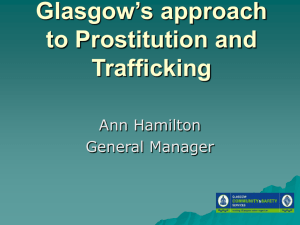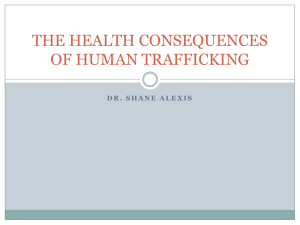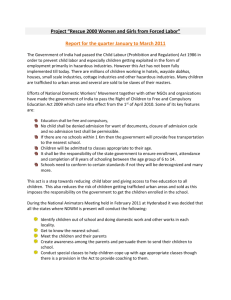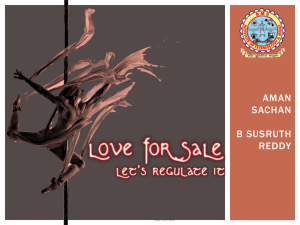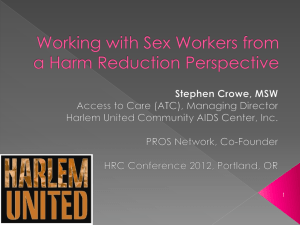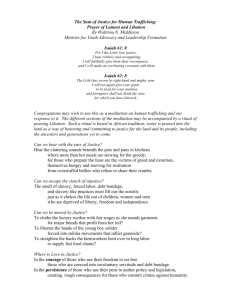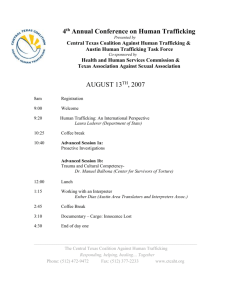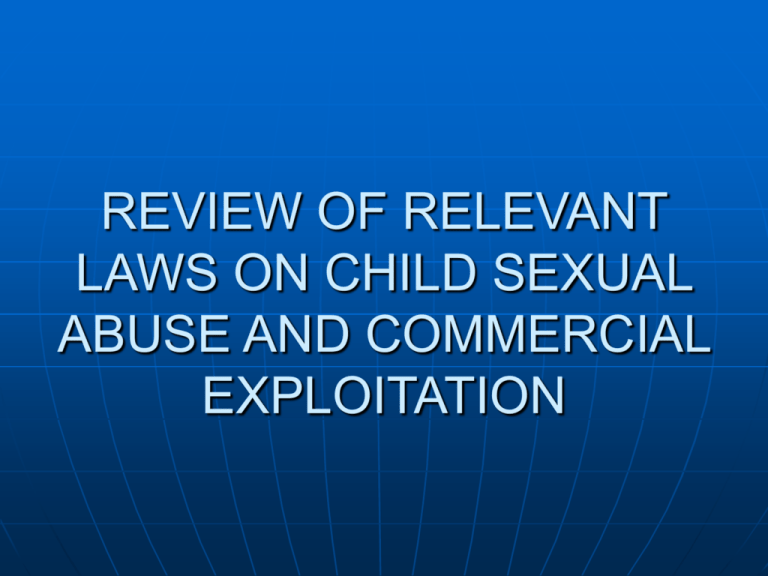
REVIEW OF RELEVANT
LAWS ON CHILD SEXUAL
ABUSE AND COMMERCIAL
EXPLOITATION
Outline of Presentation
Relevant Provisions of RA 7610
Pertinent Provisions of the RPC
RA 9208 (The Anti-Trafficking in
Persons Act of 2003)
Republic Act No.
7610
Special Protection of Children
Against Child Abuse,
Exploitation and
Discrimination
Definition
Children - persons below 18 years of
age or those over but are unable to
to fully take care of themselves or
protect themselves from abuse,
neglect, cruelty, exploitation or
discrimination because of a physical
or mental disability or condition.
Definition
CHILD ABUSE -Refers to maltreatment, whether
habitual or not, of the child which includes any of
the following;
Psychological and physical abuse, neglect,
cruelty, sexual abuse and emotional
maltreatment;
Any act by deeds or words which debases,
degrades or demeans the intrinsic worth and
dignity of a child as a human being;
Definition
CHILD ABUSE -Refers to maltreatment,
whether habitual or not, of the child which
includes any of the following;
Unreasonable deprivation of his basic
needs for survival, such as food and
shelter
Failure to immediately give medical
treatment to an injured child resulting in
serious impairment of his growth and
development or in his permanent
incapacity or death
Offenses Against Children
under RA 7610
Child Prostitution and other sexual abuse
Attempt to commit child prostitution
Child Trafficking
Attempt to commit child trafficking
Child pornography and indecent shows
and publication
Other Acts of Neglect, Abuse, Cruelty or
Exploitation and Other Conditions
Prejudicial to the Child’s Development
Child Prostitution and Other
Sexual Abuse
Who are deemed to be children exploited
in prostitution and other sexual abuse?
Children, whether male or female,
Who for money, profit, or other
consideration or due to coercion or
influence of adult, syndicate or group
Indulge in sexual intercourse or
lascivious conduct
Child Prostitution and Other
Sexual Abuse
What is lascivious conduct?
Means the intentional touching, either directly or
through clothing, of the genitalia, anus, groin, breast,
inner thigh, or buttocks; or any act of lewdness;
Done with force or intimidation, fraudulent
machination or grave abuse of authority; or where
the offended party is deprived of reason or otherwise
unconscious;
With intent to abuse, humiliate, harass, degrade the
child, or arouse or gratify the sexual desire of any
person
Bestiality, masturbation, lascivious exhibition of the
genitals or pubic area of a person
Child Prostitution and Other
Sexual Abuse
Who may be liable?
Those who engage in, or promote, facilitate or
induce child prostitution which includes, but are
not limited to, the following:
acting as a procurer of a child prostitute
inducing a person to be a client of a child prostitute
taking advantage of influence or relationship to
procure a child as a prostitute
threatening or using violence towards a child to
engage him as a prostitute
giving monetary consideration/pecuniary benefit
Penalty- Reclusion Temporal med-Reclusion Perpetua
Child Prostitution and Other
Sexual Abuse
Those who commit the act of sexual intercourse
or lascivious conduct with a child exploited in
prostitution or subjected to other sexual abuse.
Penalty-same with Art. 335 and 336 of RPC
except if victim is under 12 yrs (Rec.Temp. med)
Those who derive profit or advantage therefrom as manager or owner of the establishment where
the prostitution takes place/establishment
serving as cover or which engages in prostitution
other than activity it was licensed for.
Penalty-Reclusion Temporal med-Reclusion
Perpetua
Attempt to Commit Child
Prostitution
Any person, not being a relative of a child, is
found alone with the said child inside the room or
cubicle of a house, an inn, hotel, motel, pension
house, apartelle or other similar establishment,
vessel, vehicle or any other hidden or secluded
area which would lead a reasonable person to
believe that the child is about to be exploited in
prostitution and other sexual abuse.
Any person, receiving services from a child in a
sauna parlor or bath, massage clinic, health club
and other similar establishments.
Penalty- 2 deg.lower than that prescribed for the
consummated felony
Child Trafficking
Any person who shall engage in trading
and dealing with children including, but
not limited to, the act of buying and
selling of a child for money, or for any
other consideration or barter.
Penalty-Reclusion Temporal-Reclusion
Perpetua. If victim is under 12 years,
maximum period
Attempt to Commit
Child Trafficking
Allowing a child to travel alone to a foreign
country
Pregnant woman’s execution of affidavit of
consent to adoption of unborn child for
consideration
Recruitment of women or couples for child
bearing for purposes of child trafficking
Simulation of birth by doctor, hospital, clinic
official, etc. for the purpose of child trafficking
Finding children among low-income families,
hospitals etc. to sell
Penalty- 2 deg. Lower from the consummated felony
Obscene Publication and Indecent
Shows
hire
employ
use
obscene exhibitions
perform
pose/model
Person persuade child
induce
sell
coerce
distribute
indecent shows
live or
in video
Obscene publications
pornographic materials
pornographic materials
Penalty- Prision Mayor. If under 12 years,
maximum period.
Obscene Publications and Indecent
Shows:
Any ascendant, guardian, or person
entrusted in any capacity with care
of a child who shall cause and/or
allow such child to be employed or to
participate in an obscene play, scene,
act, movie or show or in any other
acts covered by this section shall
suffer the penalty of Prision Mayor
medium.
Other Acts of Abuse
Any person who shall commit any other acts
of child abuse, cruelty or exploitation or be
responsible for other conditions prejudicial
to the child’s development including those
covered by Art. 59 of PD 603, but not
covered by the Revised Penal Code
Penalty- Prision Mayor Minimum
Other Acts of Abuse
Any person who shall keep or have in his company
a minor, twelve (12) years or under or who is ten
(10) years or more his junior in any public or
private place, hotel, motel, beer joint, discotheque,
cabaret, pension house, sauna or massage parlor,
beach and/or other tourist resort or similar places.
Exception:Person related within the fourth degree of
consanguinity or affinity or any bond recognized by
law, local customs and tradition or acts in the
performance of a social, moral or legal duty.
Penalty- Prision Mayor maximum and fine of not
less than Php 50,000.00.
Other Acts of Abuse
Any person who shall induce or deliver or offer a
minor to anyone prohibited under R.A. 7610 as
above described.
Penalty-Prision Mayor Medium and fine of not less
than Php 50,00.00.
Any person, owner, manager or one trusted with the
operation of any public or private place of
accommodation, whether for occupancy, food,
drink, or otherwise, including residential places,
who allows any person to take along with him such
place or places any minor herein described.
Penalty-Prision Mayor Medium and fine of not less
than Php 50,000.00
Other Acts of Abuse
Any person who shall use, coerce, force or
intimidate a street child or any other child
to:
beg or use begging as a means of living
act as conduit or middleman in drug
trafficking or pushing
conduct any illegal activities.
Penalty- Prision Correccional Medium-Reclusion
Perpetua
Penalties for Specific Crimes
When victim is under 12 years and for
purposes of this act, the penalties for
Murder, Homicide, other intentional
mutilation, Serious Physical InjuriesReclusion Perpetua.
For Qualified Seduction, acts of
lasciviousness with consent, corruption of
minors, white slave trade- one degree
higher than that imposed by law.
Remedial Procedures
Who may file a complaint?
Offended Party
Parents or Guardians
rd
Ascendant or collateral relative within 3
degree of consanguinity
Officer, social worker or representative of a
licensed child-caring institution
Officer or social worker of the DSWD
Barangay Chairman, or
Three (3) concerned, responsible citizens
where the offense was committed
Remedial Procedures
Protective Custody of the Child
(DSWD will be free from any administrative, civil or
criminal liability)
Confidentiality
Name of the offended party withheld from the public
until the court acquires jurisdiction
Unlawful to cause undue and sensationalized publicity of
any case
Special Court Proceedings
Protection of victim from undue publicity
(IRR) records
Pertinent Provisions
of the
Revised Penal Code
Rape (Art. 266-A)
As amended by RA 8353, “The Anti-Rape Law of 1997”
Expanded the definition of the crime of
rape to include sexual assault
Reclassified rape as a crime against
persons
Added “fraudulent machinations or grave
abuse of authority” as a fourth mode of
committing rape under parag.1
Considered demented persons statutory
rape
Rape (Art. 266-A)
As amended by RA 8353, “The Anti-Rape Law of 1997”
How rape is committed?:
By a man who shall have carnal knowledge with a
woman under any of the following circumstances:
through force, threat or intimidation
when the offended party is deprived of
reason or otherwise unconscious
by means of fraudulent machination or
grave abuse of authority
when the offended party is under 12 or is
demented, even though none of the
circumstances mentioned above
Rape (Art. 266-A)
As amended by RA 8353, “The Anti-Rape Law of 1997”
How rape is committed?:
By any person who, under any of the
circumstances mentioned in par. 1, shall commit
an act of sexual assault by inserting
his penis into another’s mouth or anal
orifice
any instrument or object into the genital or
anal orifice of another person
Other Crimes under the RPC
Acts of lasciviousness (Art. 336)
offender commits any act of lasciviousness or
lewdness
committed using force or intimidation;
offended party is deprived of reason or
otherwise unconscious; offended party is
below twelve (amended by RA 7610)
Acts of lasciviousness with the consent of
the offended party
offended party is a woman above 12 or under
18
committed under the circumstances and by
the same circumstances under Arts. 337 and
388
Other Crimes under the RPC
Qualified seduction
offended party was a virgin at the time
of the commission of the offense
offended party is over 12 but under 18
offender had carnal knowledge
offender is one of those persons
enumerated under Art. 337 par. 1 (a
person in public authority, a priest,
house-servant, domestic, guardian,
teacher, or any person entrusted with
the custody or education if the woman)
Note: consent or deceit not essential
elements; virginity refers to chaste
character not physical virginity
Other Crimes under the RPC
Simple seduction
offended party must be single or a
widow
of good reputation (virginity not
essential)
over 12 and under 18
offender had carnal knowledge of her
act was committed by means of deceit
Other Crimes under the RPC
Corruption of minors
• how committed?
Habitually promoting or facilitating the
prostitution or corruption of a minor of
either sex
promoting or facilitating the
prostitution or corruption of a minor,
the offender availing of his authority
over the minor, or acts with abuse of
confidence
Note: habituality or abuse of authority
is no longer an element of the offense
(BP 92)
Other Crimes under the RPC
White Slave Trade
• how committed?
By engaging in the business of
prostitution
By profiting by prostitution
By enlisting the services of women for
the purpose of prostitution
liability attaches: a) enlistment
without sharing in the profit; or b)
sharing in the profit without
enlistment
Other Crimes under the RPC
Forcible abduction
the persons kidnapped must be a
woman (immaterial whether she is a
widow, married or virgin)
committed against her will (except for
those under 12)(by means of deceit or
violence)
committed with unchaste designs, that
is with the intention of lying with the
woman (if w/o lewd designs, illegal
detention; but if forcibly taken to
coerce her to marry him, grave
coercion)
Anti-Trafficking in
Persons Act of 2003
Pros. Lolita L. Lomanta
Office of the Cebu Provincial
Prosecutor
Republic Act 9208
AN ACT TO INSTITUTE POLICIES TO ELIMINATE
TRAFFICKING IN PERSONS EXPECIALLY
WOMEN AND CHILDREN, ESTABLISHING THE
NECESSARY INSTITUTIONAL MECHANISMS
FOR THE PROTECTION AND SUPPORT OF
TRAFFICKED PERSONS, PROVIDING
PENALTIES FOR ITS VIOLATIONS, AND FOR
OTHER PURPOSES
DEFINITION OF TERMS
TRAFFICKING IN
PERSONS:
Refers to the:
a) recruitment,
b) transportation,
c) transfer, or
d) harboring, or
e) receipt of persons
with or without the victims consent or
knowledge,
within or across national borders
by means of:
a) threat or use of force, or other forms of
coercion,
b) abduction,
c) fraud,
d) deception,
e) abuse of power or of position,
f) taking advantage of the vulnerability
of the person, or
g) the giving or receiving of payments
or benefits to achieve the consent of a
person having control of another person
For the purpose of exploitation which
includes at the minimum:
a) exploitation or prostitution
b) other forms of sexual exploitation
c) forced labor or services, slavery,
servitude or
d) removal or sale of organs
If the victim is a child, the recruitment,
transportation, transfer, harboring or
receipt shall be considered “trafficking
in persons” even if it does not involve
any of the means set forth in the
preceding paragraph
Acts of Trafficking in Persons
To recruit, transport, transfer, harbor,
provide, or receive a person by any
means, including those done under
the pretext of domestic or overseas
employment or training or
apprenticeship, for the purpose of
prostitution, etc…
Acts of Trafficking in Persons (2)
To introduce or match for money,
profit, or material, economic or other
consideration, any person or, as
provided for under Republic Act No.
6955, any Filipino woman to a
foreign national, for marriage for the
purpose of acquiring, buying,
offering, selling or trading him/her to
engage in prostitution, etc…
Acts of Trafficking in Persons (3)
To offer or contract marriage, real or
simulated, for the purpose of
acquiring, buying, offering, selling, or
trading them to engage in
prostitution, etc…
Acts of Trafficking in Persons (4)
To undertake or organize tours and
travel plans consisting of tourism
packages or activities for the purpose
of utilizing and offering persons for
prostitution, pornography or sexual
exploitation;
To maintain or hire a person to
engage in prostitution or
pornography;
Acts of Trafficking in Persons (5)
To adopt or facilitate the adoption of
persons for the purpose of
prostitution, etc…
To recruit, hire, adopt, transport or
abduct a person, by means of threat
or use of force, fraud, deceit,
violence, coercion, or intimidation for
the purpose of removal or sale of
organs of said person
Acts of Trafficking in Persons (6)
To recruit, transport or adopt a child
to engage in armed activities in the
Philippines or abroad
Acts that Promote Trafficking
in Persons
To knowingly lease or sublease, use
or allow to be used any house,
building or establishment for the
purpose of promoting trafficking in
persons
Acts that Promote Trafficking
in Persons (2)
To produce, print and issue or
distribute un-issued, tampered or
fake counseling certificates,
registration stickers and certificates
of any government agency which
issues these certificates and stickers
as proof of compliance with
government regulatory and predeparture requirements for the
purpose of promoting trafficking
Acts that Promote Trafficking
in Persons (3)
To advertise, publish, print,
broadcast or distribute, or cause the
advertisement, publication, printing,
broadcasting or distribution by any
means, including the use of
information technology and the
internet, or any brochure, flyer, or
any propaganda material that
promotes trafficking
Acts that Promote Trafficking
in Persons (4)
To assist in the conduct of
misrepresentation or fraud for
purposes of facilitation the
acquisition of clearances and
necessary exit document from
government agencies mandated to
provide pre-departure registration
and services for the purpose of
promoting trafficking
Acts that Promote Trafficking
in Persons (5)
To facilitate, assist or help in the exit
and entry of persons from/to the
country at international and local
airports, territorial boundaries and
seaports who are in possession of
un-issued, tampered or fraudulent
travel documents for the purpose of
promoting trafficking in persons
Acts that Promote Trafficking
in Persons (6)
To confiscate, conceal, or destroy the
passport, travel documents, or
personal documents or belongings of
trafficked persons in furtherance of
trafficking or to prevent them from
leaving the country or seeking
redress from the government or
appropriate agencies
Acts that Promote Trafficking
in Persons (7)
To knowingly benefit from, financial
or otherwise, or make use of, the
labor or services of a person held to
a condition of involuntary servitude,
forced labor, or slavery
Qualified Trafficking in
Persons
When the trafficked person is a child
When the adoption is effected
through Republic Act No. 8043,
otherwise known as the “InterCountry Adoption Act of 1995” and
said adoption is for the purpose of
prostitution, etc..
Qualified Trafficking in
Persons (2)
When the crime is committed by a
syndicate, or in large scale.
Trafficking is deemed committed by a
syndicate if carried out by a group of
three (3) or more persons conspiring
or confederating with one another. It
is deemed committed in large scale if
committed against three (3) or more
persons, individually or as a group
Qualified Trafficking in
Persons (3)
When the offender is an ascendant,
parent, sibling, guardian or a person
who exercises authority over the
trafficked person or when the offense
is committed by a public officer or
employee
Qualified Trafficking in
Persons (4)
When the trafficked person is
recruited to engage in prostitution
with any member of the military or
law enforcement agencies
When the offender is a member of
the military or law enforcement
agencies
Qualified Trafficking in
Persons (4)
When by reason or on occasion of
the act of trafficking in persons, the
offended party dies, becomes insane,
suffers mutilation or is afflicted with
Human Immunodeficiency Virus
(HIV) or the Acquired Immune
Deficiency Syndrome (AIDS).
Penalties
Acts of Trafficking – imprisonment of
twenty (20) years and a fine of not
less than One million Pesos but not
more than Two million pesos
Penalties (2)
Acts that promote trafficking –
imprisonment of fifteen (15) years
and a fine of not less than Five
hundred thousand pesos but not
more than One million pesos
Penalties (3)
Qualified trafficking – life
imprisonment and a fine of not less
than Two million pesos but not more
than Five million pesos
Use of Trafficked Persons
Any person who buys or engages the
services of trafficked persons for
prostitution shall be penalized as follows:
(a) First offense – six(6) months of
community service as may be
determined by the court and a fine of
Fifty thousand pesos(P50,000.00); and
(b) Second and subsequent offenses –
imprisonment of one (1) year and a fine
of One hundred thousand pesos
(P100,000.00).
Confidentiality
At any stage of the investigation, prosecution and
trial of an offense under the Act, law enforcement
officers, prosecutors, judges, court personnel and
medical practitioners, as well as parties to the
case, shall recognize the right to privacy of the
trafficked person and the accused.
Law enforcement officers, prosecutors and judges
to whom the complaint has been referred may
order a closed-door investigation, prosecution or
trial. The name and personal circumstances of
the trafficked person or of the accused, or any
other information tending to establish their
identities shall not be disclosed to the public
Confidentiality
In cases when the prosecution or trial is
conducted behind closed doors, it shall be
unlawful for any editor, publisher, and
reporter or columnist in case of printed
materials, announcer or producer in case
of television and radio, producer and
director of a film in case of the movie
industry, or any person utilizing tri-media
facilities or information technology to
cause publicity of any case of trafficking in
persons.
Penalty: imprisonment of six (6) years
and a fine of not less than Five hundred
pesos but not more than One million Pesos
PROGRAMS AND PROTECTION
(2)
Roles and Responsibilities of LGUs:
• Monitor and document cases of trafficked
persons in their areas of jurisdiction
• Effect the cancellation of licenses of
establishments which violate the provisions of
the Act and ensure its effective prosecution
• Undertake an information campaign against
trafficking in persons through the
establishment of the MAIN desks in
municipalities and provinces in coordination
with DILG, PIA, CFO, NGOs
PROGRAMS AND PROTECTION
(3)
Roles and Responsibilities of LGUs:
• Encourage and support community based
initiatives which address trafficking in persons;
• Provide basic social services for the
prevention, rescue, recovery, rehabilitation and
reintegration/after care services to victims of
trafficking and their family
• Enact ordinances or issuances aimed at
providing protection and support to trafficked
persons and adopt measures to prevent and
suppress trafficking
PROGRAMS AND PROTECTION
(4)
Roles and Responsibilities of LGUs:
• Strengthen, activate and mobilize
existing committees, councils, similar
organizations and special bodies at the
provincial, city, municipal and barangay
levels to prevent and suppress
trafficking in persons
PROGRAMS AND PROTECTION
(6)
Legal Protection –
trafficked persons are recognized as victims and shall not
be penalized for crimes directly related to the acts of
trafficking or in obedience to the order made by the
trafficker. Consent of trafficked person to the intended
exploitation shall be irrelevant.
Witness protection program under R.A. 6981
Mandatory services:
•
•
•
•
•
•
Emergency shelter or appropriate housing
Counseling
Free legal services
Medical or psychological services
Livelihood and skills training
Educational Assistance to a trafficked child
Who can file complaint:
Any person who has personal
knowledge of the commission of any
offense under this Act
The Trafficked person
The parents
Spouse
Siblings
Children
Legal Guardian
Where to file complaint:
Where the offense was committed,
Where any of its element occurred, or
Where the trafficked person actually
resides at the time of the commission of
the offense
Proviso: that the court where the criminal
action is first filed shall acquire jurisdiction
to the exclusion of other courts
Prescriptive period:
Trafficking cases under this Act shall
prescribe in ten (10) years.
Exception: When committed by a
syndicate or in a large scale, they
prescribe in twenty (20) years.
THE END
DAGHANG SALAMAT
Good Day To All!!!

